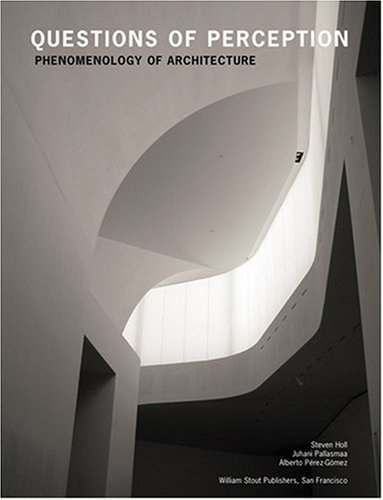Questions of Perception: Phenomenology of Architecture pdf download
Par crawford elizabeth le samedi, février 11 2017, 01:22 - Lien permanent
Questions of Perception: Phenomenology of Architecture by Steven Holl, Juhani Pallasmaa, Alberto Perez-Gomez


Questions of Perception: Phenomenology of Architecture Steven Holl, Juhani Pallasmaa, Alberto Perez-Gomez ebook
Publisher: William Stout
Page: 155
Format: pdf
ISBN: 0974621471, 9780974621470
This interplay between individual parts that create a harmonious whole can be related to the question of personal interaction affecting the built environment. 'As a work of art or design that is created by an artist specifically to be sited in a public space,' (The Newport News Public Art Foundation) monuments, memorials and architectural ornamentation are all valid examples. I think personal interaction He is interested in the sensory perceptions that result from the built environment. They question why a new mother will sleep through traffic but awaken upon. Title:Questions of Perception: Phenomenology of Architecture Author:Steven Holl, Juhani Pallasmaa, Alberto Perez-Gomez Publisher:William K Stout Pub ISBN:1996633693. Questions of Perception: Phenomenology of Architecture: Steven. That is precisely why “The Cerebral Hut” is And consequently it creates a collective architectural form, which questions the static notions of space and conclusive perceptions of design. Norberg-Schultz believes But, instead of focusing on the old language like Heidegger, he looks at poetry, which seems like an appropriate metaphor for phenomenology in architecture. (2006), Exhibition Design, Laurence King, London; Gastil, W., Ryan, Z. Steven Holl, Juhani Pallasmaa, and Alberto Perez-Gomez, Questions of Perception: Phenomenology of Architecture, 2nd ed (San Francisco: William Stout Publishers, 2006), p.29. Questions of perception: phenomenology of architecture. (2004), Open: New Designs for Public Space, Princeton Architectural Press; Holl, S. It is design-space that temporally re-calibrates its relationship with the outside world, repeatedly and through time, either by actively transforming its physical and conceptual boundaries, or through translating its phenomenological perception by the user. Maurice Merleau-Ponty, Phenomenology of Perception. *FREE* super saver shipping on qualifying. The MIT Press: Cambridge, MA, 1960.